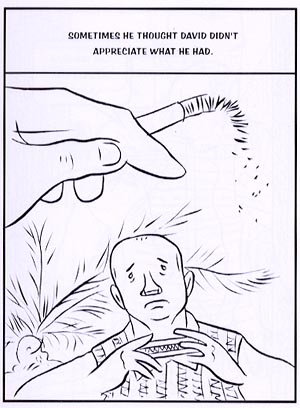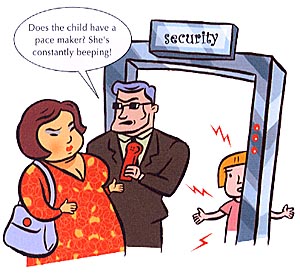 By the Actus Group
By the Actus Group
120 pages, color and black & white
Published by Actus Independent Comics, distributed in North America by Top Shelf Productions
Every time a friend of mine goes to the Angouleme comics festival in France, he brings back a copy of the Actus group’s new book. A five-person Israeli comic collective, their releases are always odd and intriguing, and even if I don’t like all the entries, I never feel like I’ve wasted my time. This year’s book, Dead Herring Comics, has both some familiar and new guest contributors added into the mix. The result? It’s mostly a good thing indeed, this dead herring…
 My favorite story this year has to be Yirmi Pinkus’s “Rodnitzky’s Agony”, which details the life of accountant Miki Rodnitzky as he begins to have a nervous breakdown. Unable to function, he goes to a doctor that gives him David, a man who will live in Miki’s house and forever observe him, but never speak. Watching Miki’s behavior change when he’s observed is fascinating, at the same time asking the reader what differences we all make in our own lives when it is for an audience. Pinkus’s art uses a nice fine line, with open canvases for faces. At the same time you can really feel like you’re seeing into Miki’s heart and mind, Pinkus bringing every stray thought of Miki’s to life.
My favorite story this year has to be Yirmi Pinkus’s “Rodnitzky’s Agony”, which details the life of accountant Miki Rodnitzky as he begins to have a nervous breakdown. Unable to function, he goes to a doctor that gives him David, a man who will live in Miki’s house and forever observe him, but never speak. Watching Miki’s behavior change when he’s observed is fascinating, at the same time asking the reader what differences we all make in our own lives when it is for an audience. Pinkus’s art uses a nice fine line, with open canvases for faces. At the same time you can really feel like you’re seeing into Miki’s heart and mind, Pinkus bringing every stray thought of Miki’s to life.
Also fun is Itzik Rennert’s “Bombshell”, which uses a cartoonish, children’s style artwork to tell a fable of a little girl who is so distressed by her father’s job that she breaks into his workplace at night and eats spare parts. The artwork is adorable, and it helps bridge the gap between the serious (a girl forced to live a lie to protect her father’s job that she hates) and the ludicrous (…so she eats pieces of machinery in her sleep). When the story comes to its inevitable explosive conclusion, I couldn’t help but laugh a great deal.
 Mira Friedmann’s “So Far So Good” was almost a bit of a disappointment after loving her story in 2002’s Happy End. Her tale of Tami witnessing a possible murder and then being besieged by both the secret police and a former lover should have interested me more, but its abrupt ending left me somewhat cold. Friedmann’s no stranger to slightly experimental storytelling, but here I wanted to see what happened next—and the lack of that knowledge was more disappointing than the intended reaction of being intrigued. It’s tough to tackle a non-ending of a story and make it work, and here it just seems to fall flat.
Mira Friedmann’s “So Far So Good” was almost a bit of a disappointment after loving her story in 2002’s Happy End. Her tale of Tami witnessing a possible murder and then being besieged by both the secret police and a former lover should have interested me more, but its abrupt ending left me somewhat cold. Friedmann’s no stranger to slightly experimental storytelling, but here I wanted to see what happened next—and the lack of that knowledge was more disappointing than the intended reaction of being intrigued. It’s tough to tackle a non-ending of a story and make it work, and here it just seems to fall flat.
Also surprising in my lack of reaction was the excerpt from art spiegelman’s upcoming In the Shadow of No Towers. These six pages about the destruction of the World Trade Center in New York and the ensuing reaction seemed to, for the most part, lack any real punch. Perhaps when they originally ran in The New Yorker they had a stronger emotion behind them, but now it just feels like you’re reading something that has already expressed by many others, and better. (Although to be fair, the various 9/11 anthologies published in 2002 proved that while those sentiments could have been expressed better, it was also very easy to do far worse.) Perhaps when Pantheon publishes the entire collection in September it will hold together more, but for now it just does nothing for me.
The rest of the anthology is a mixed bag. Rutu Modan’s “Energy Blockage” feels twice as long as it really is, if still providing a solid conclusion that almost makes up for its meandering style. Likewise, Batia Kolton’s “Compensation” just feels overly long and drawn out, leaving its punchline almost buried when it deserved to be recognized as the best part of the story. Guest contributor Ulf K.’s “Mister Hieronymus Goes Fishing”, conversely, feels like such a short piece of fluff that it almost doesn’t seem to belong. Only Etgar Keret’s short stories and Henning Wagenbreth’s “Plastic Dog” strips did absolutely nothing for me; the latter didn’t surprise me with its crude 8-bit computer throwback art style, but Keret’s lackluster stories were a real disappointment, after loving his contributions in earlier Actus books (as well as the Hanuka twins’s Bipolar).
I certainly don’t feel like I wasted my time with Dead Herring Comics; Pinkus’s and Rennert’s stories alone were worth the price of admission, and despite the jarring ending of Friedmann’s story or the slight over-length of Modan and Kolton’s pieces, I am definitely glad I read them. All of them had something strong to offer, even if all the pieces didn’t seem to always be there. Actus’s high points for me are probably still Happy End and Jetlag, but I certainly won’t forget Dead Herring Comics anytime soon.
Purchase Links:
